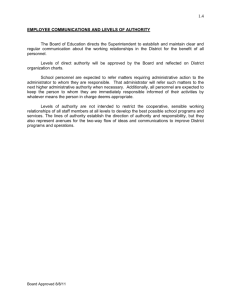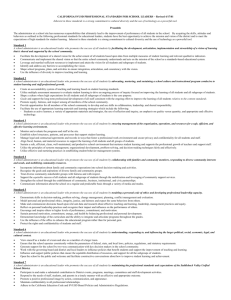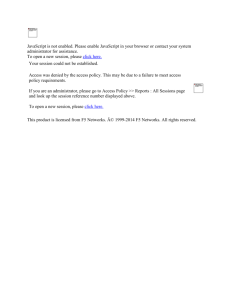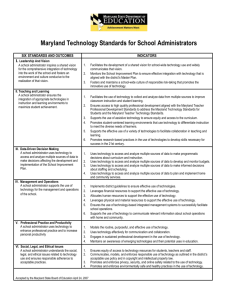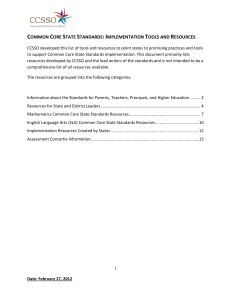ISLLC Domain Chart - Cobb County School District
advertisement
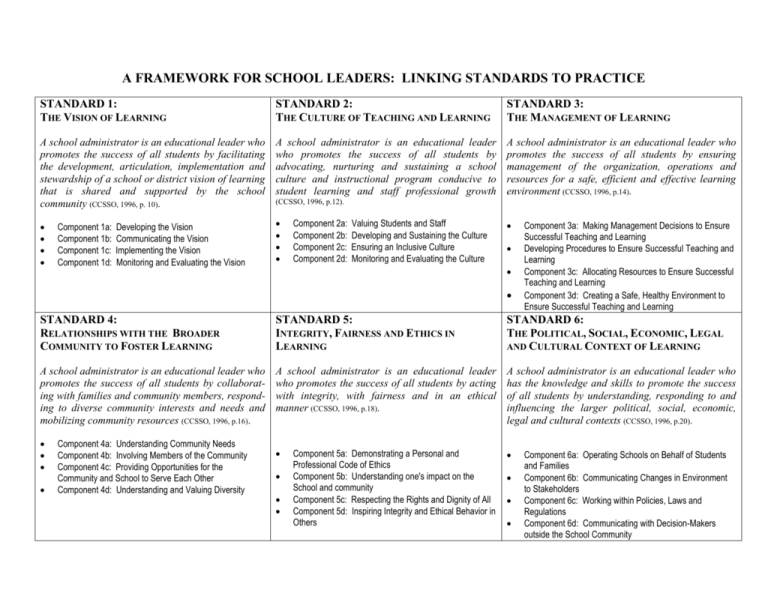
A FRAMEWORK FOR SCHOOL LEADERS: LINKING STANDARDS TO PRACTICE STANDARD 1: THE VISION OF LEARNING STANDARD 2: THE CULTURE OF TEACHING AND LEARNING STANDARD 3: THE MANAGEMENT OF LEARNING A school administrator is an educational leader who promotes the success of all students by facilitating the development, articulation, implementation and stewardship of a school or district vision of learning that is shared and supported by the school community (CCSSO, 1996, p. 10). A school administrator is an educational leader who promotes the success of all students by advocating, nurturing and sustaining a school culture and instructional program conducive to student learning and staff professional growth A school administrator is an educational leader who promotes the success of all students by ensuring management of the organization, operations and resources for a safe, efficient and effective learning environment (CCSSO, 1996, p.14). Component 1a: Component 1b: Component 1c: Component 1d: Developing the Vision Communicating the Vision Implementing the Vision Monitoring and Evaluating the Vision (CCSSO, 1996, p.12). Component 2a: Component 2b: Component 2c: Component 2d: Valuing Students and Staff Developing and Sustaining the Culture Ensuring an Inclusive Culture Monitoring and Evaluating the Culture Component 3a: Making Management Decisions to Ensure Successful Teaching and Learning Developing Procedures to Ensure Successful Teaching and Learning Component 3c: Allocating Resources to Ensure Successful Teaching and Learning Component 3d: Creating a Safe, Healthy Environment to Ensure Successful Teaching and Learning STANDARD 4: RELATIONSHIPS WITH THE BROADER COMMUNITY TO FOSTER LEARNING STANDARD 5: INTEGRITY, FAIRNESS AND ETHICS IN LEARNING STANDARD 6: THE POLITICAL, SOCIAL, ECONOMIC, LEGAL AND CULTURAL CONTEXT OF LEARNING A school administrator is an educational leader who promotes the success of all students by collaborating with families and community members, responding to diverse community interests and needs and mobilizing community resources (CCSSO, 1996, p.16). A school administrator is an educational leader who promotes the success of all students by acting with integrity, with fairness and in an ethical manner (CCSSO, 1996, p.18). A school administrator is an educational leader who has the knowledge and skills to promote the success of all students by understanding, responding to and influencing the larger political, social, economic, legal and cultural contexts (CCSSO, 1996, p.20). Component 4a: Understanding Community Needs Component 4b: Involving Members of the Community Component 4c: Providing Opportunities for the Community and School to Serve Each Other Component 4d: Understanding and Valuing Diversity Component 5a: Demonstrating a Personal and Professional Code of Ethics Component 5b: Understanding one's impact on the School and community Component 5c: Respecting the Rights and Dignity of All Component 5d: Inspiring Integrity and Ethical Behavior in Others Component 6a: Operating Schools on Behalf of Students and Families Component 6b: Communicating Changes in Environment to Stakeholders Component 6c: Working within Policies, Laws and Regulations Component 6d: Communicating with Decision-Makers outside the School Community

